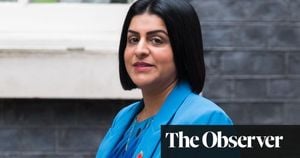Delegates, experts, and activists gathered for COP29 this year, elbow-to-elbow like travelers caught up at the world’s busiest airport during the holiday rush. The event took place under the cavernous roof of Baku, Azerbaijan, where the air thickened not just with the excitement of anticipation, but also with palpable tension and frustration. Given the host nation’s status as a leading authoritarian regime—and major oil and gas producer—much skepticism loomed over the proceedings, as many questioned the appropriateness of Azerbaijan steering such significant climate negotiations.
Critics took aim at the choice of host country even before the first delegate set foot inside. An open letter penned by scientists, international organizations, and former government officials urged the UN Secretariat for COP reform, highlighting concerns about Baku’s ability to guide the complex discussions necessary for real climate action. Many world leaders from prominent nations such as the U.S., France, and even Brazil, who will host COP30 in 2025, chose to snub the conference altogether, opting for the concurrent G20 Summit instead.
Throughout COP29, the primary focus was meant to revolve around establishing clear financing goals for climate action, especially for developing nations. This was dubbed the ‘finance COP,’ which makes sense, as many delegates were pushed to recalibrate their commitment to reducing greenhouse gas emissions and rapidly shift toward renewable energy investments. The climate crisis is no small matter—CO2 emissions reached record highs of 37.4 billion tonnes globally, rising 0.8 percent from the previous year.
UNFCCC Executive Secretary Simon Stiell noted tensions were evident early on, with representatives from wealthier nations stalling progress on new financial commitments without first widening the pool of donor nations. On the flip side, countries representing the Global South were clear: no new emissions reduction agreements without guaranteed funding. For outsiders watching the drama unfurl, it seemed utterly illogical, akin to speeding toward a brick wall without wanting to apply the brakes due to faulty seatbelts.
Adding to the disarray was the arrival of roughly 700 fossil fuel lobbyists who allegedly mingled throughout the event, trying to tilt the discussions back toward traditional energy sources. The mere presence of these lobbyists was indicative of how traditional energy concerns could overshadow the urgent environmental crisis at hand.
By the closing hours of the conference, negotiators had finally settled on the New Collective Quantitative Goal (NCQG) for climate finance, setting the target at $300 billion per year for developing nations by 2035, tripling the previous promise of $100 billion. But for many, this was simply inadequate. Leaders from the least developed countries and small island states called the outcome insulting, describing it as far short of the $1.3 trillion the global community truly needs.
Please take note: no consensus was reached on rolling back the reliance on fossil fuels, with no renewed calls for phasing them down included. Instead, the discussions resettled on issues surrounding financial assistance and mitigating emissions, resulting in disappointingly little headway toward solving the problems they initially intended to tackle.
Azerbaijan's leadership certainly clouded COP29's objectives. President Ilham Aliyev heralded oil and gas as “gifts from God”, mirroring sentiments witnessed last year at COP28, where fossil fuel phase-out was downplayed and even dismissed. With this year set to mark the hottest recorded, these proclamations seemed out of touch with the urgency of the climate crisis as nations struggled to lay out substantial strategies for renewal.
While the Azerbaijani regime sought to paint the event as one of international cooperation by sprucing up historic buildings around Baku, the darker underbelly of environmental neglect raised more questions than answers. The Caspian Sea’s pollution from oil operations has become so severe, scientists warn of ecological collapse by the century’s end. A worrying reality check for the conference participants.
To deepen the concern, the backdrop of human rights abuses and lack of free speech within Azerbaijan's borders punctuated the proceedings. Amidst politically charged discussions, climate activists and dissenters faced crackdowns, with governmental pressure on civil society limiting participation from various organizations. The impact loomed large over the event, where comprehensive engagement—and offers of transparency—remained starkly absent.
While many arrangement details were lost, some participants focused on constructive measures for measuring progress and commitment levels for energy transition. The Saudi Arabian delegation, for example, asserted rejection of any UN climate deals active against fossil fuels—further complicity seen through the lens of lobbyist influence held. Observers believed the Azerbaijan presidency's inability to champion fundamental fossil fuel obligations and targeted policies illustrated how firmly entrenched fossil fuel dependence still is.
This year’s COP29 had immense expectations, yet as the final hours ebbed away, numerous representatives, particularly from vulnerable island nations, conveyed disappointment at the watered-down texts. Their cries echoed: "We came here to translate historic commitments made last year, and quite simply, we have fallen short.” Post COP28, hope and ambition were meant to flourish, but the talks shifted back toward uncertainty and neglect.
The international community remains anchored on specific climate targets, primarily capped at the 1.5-degree Celsius threshold above pre-industrial temperatures. Yet preliminary research unveiled during COP29 depicts fossil fuel emissions still climbing, with impactful repercussions hinted throughout. Experts suggested the failure to reinforce emissions provisions at Baku left the 1.5-degree commitment hanging on life support—an unsettling thought for countries prioritizing sustainability.
Experts like Laurence Tubiana, who contributed significantly to the formation of the 2015 Paris Climate Accord, elucidated the dire conditions left after Baku’s shortcomings. She lamented, “The situation is dire; the impacts of climate change are exacerbated, and the answers remain apparent yet unacknowledged during this COP.” This sentiment cascaded throughout the atmosphere, even as richer historic polluters barely achieved the minimal requirements set forth by the conference. With these legislative failures overshadowing advancements, skepticism about future global negotiations was certainly contagious.
With talk of sidestepped progress-relay toward the next meeting slated for June, stakeholders were left to ponder: can COP30 yield any genuine advancements, or have fossil fuel interests solidified their grip on the future of climate action?



